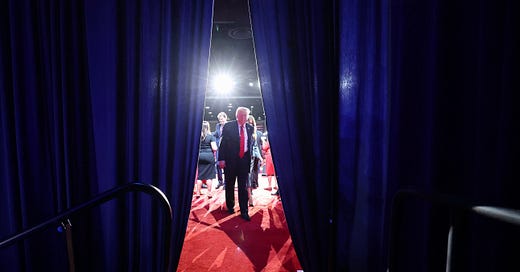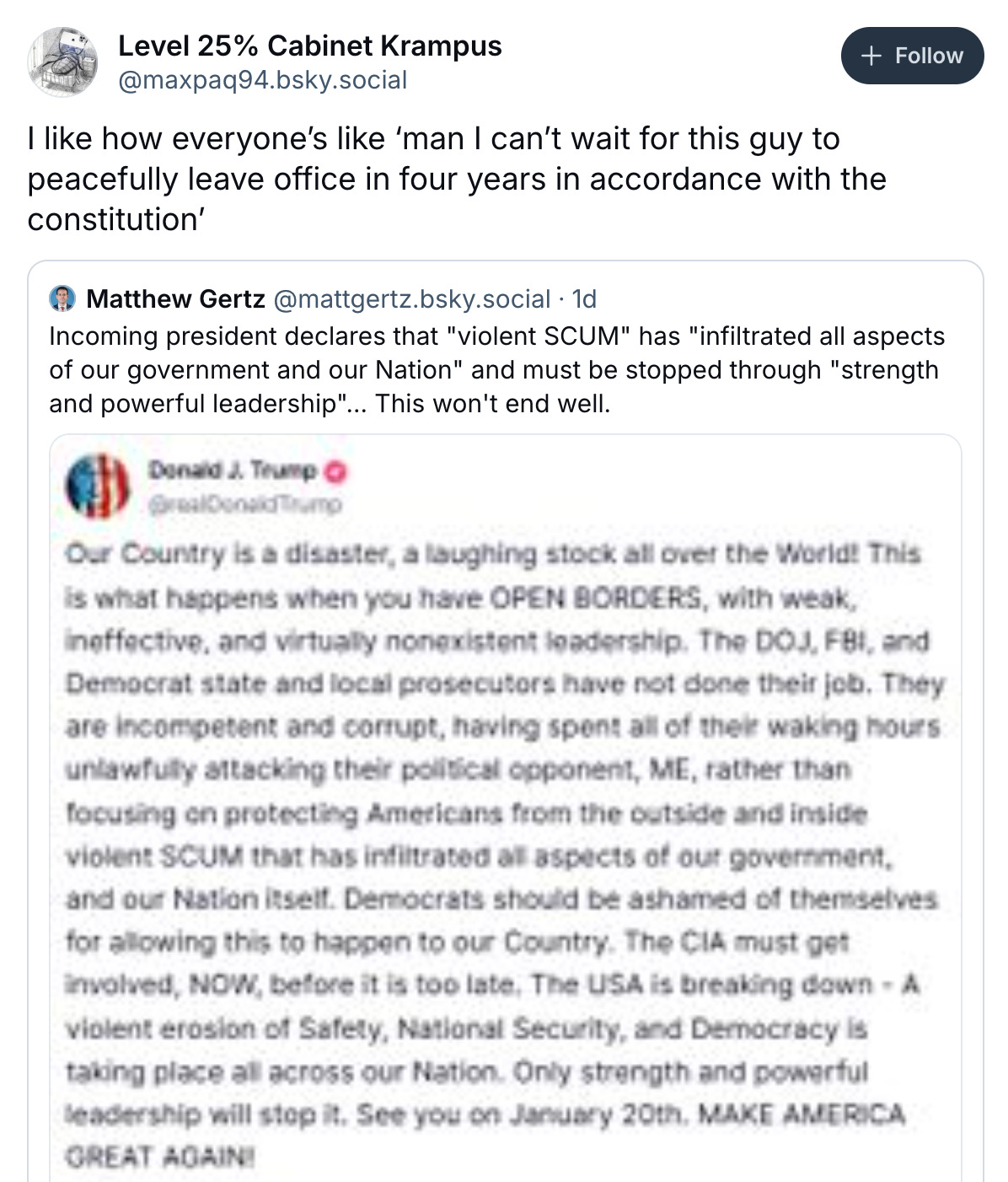Will He or Won’t He?
Donald Trump is term-limited by the 22nd Amendment, right? RIGHT?!?
1. Undercurrents
A couple weeks ago Sarah said that the most powerful underlying dynamic in politics right now is Donald Trump’s lame-duck status. That’s mostly right. The general sense in the air—from the business community to Republicans, to some Democrats, even—is basically a version of “What is the downside for humoring him for this little bit of time?”
Except that “this little bit of time” is four years.
But I think the reality of the dynamic is slightly more complicated:
People believe that Trump is probably a lame duck. But no one is absolutely certain of it.
Believe me, I know this sounds paranoid and slightly crazy. But in 1985, or 1997, or 2005, or 2009, you could have asked any member of the re-elected president’s party, “Can your guy run for a third term?” And they would have been happy to answer—on the record—“Of course not.”
I don’t think that’s where we are right now.
Trump has already socialized the idea in his “I’m kidding but maybe not kidding” way. He understands that the longer he holds out the prospect of a third term, the more power he has over the Republican party.
And for their part, Republicans understand that:
Trump really might attempt it. After you’ve tried a coup, who can say that you wouldn’t challenge the Twenty-second Amendment?
The Supreme Court could allow it.
So you’re not going to find a lot of Republicans willing to say, flat out, “Of course Trump can’t run.” They understand that such a statement would be an attack on Trump’s position of strategic ambiguity.
Which means, in turn, that we’re going to spend at least the next two years watching a “will he / won’t he” script in which people mostly (but only implicitly) act like Trump is a lame duck, but no one is willing to fully commit themselves to the proposition.
Keep your eye on this dynamic, because it’s going to drive a lot of the action in the Republican party, the media, and the business community.
2. SCOTUS
Let’s talk about the Supreme Court component of this dynamic.
Earlier this week John Roberts issued a report in which he implored elected officials to abide by judicial rulings. The only reasonable way to read the chief’s missive is in light of the fact that the incoming vice president has explicitly said on multiple occasions that a President Trump could defy a ruling from the Supreme Court.
First: When you have to ask people to accede to your authority, you’re conceding that your authority is conditional. And there is a strain of legal thought which agrees that the Court’s rulings are conditional. In defending JD Vance’s views on SCOTUS, law professor Josh Blackman wrote,
Once we get to a point where the Court itself is flagrantly violating the Constitution, then I think there is a different conversation to be had. Frankly, I appreciate Vance’s candor. Roberts can hide behind the veneer of judicial supremacy, but there is a limit to any Court’s powers. And we shouldn't pretend otherwise.
Yikes.1
Second: Please do not tell me that the text of the Twenty-second Amendment is ironclad. The Constitution is whatever five justices say it is. This court invented a right of presidential immunity and gutted the Fourteenth Amendment. History is full of SCOTUS rulings that were baldly incompatible with the text of the Constitution (Dred Scott, Plessy) but were sustained by a majority of justices.
It is absolutely possible that, if Trump were to attempt to run for a third term, the Roberts court could decide to legitimize that act. Would it matter if such a legitimization was ridiculous on its face? No. Not in the least.
Third: Roberts is, by his own admission, concerned about preserving the Court’s authority. One way to achieve that goal is to win a showdown with the executive branch. Another way to is avoid direct confrontation.
I expect that the Court will hear a number of cases involving the Trump administration—possibly beginning with an attempt to discontinue birthright citizenship. On small matters, the Court will (hopefully) be comfortable ruling against Trump.
But on large matters it is unclear that Roberts would be willing to risk a confrontation in which Trump might attempt to defy the Court’s authority.
Walk through what such a scenario might look like on, say, birthright citizenship.
Trump issues an executive order rescinding birthright citizenship. It’s immediately challenged and a lower court issues an injunction pending review.
The case makes its way up to the Supreme Court and the Court rules that the EO is unconstitutional. But the actual issuance of Social Security numbers is a function of the executive branch. Let’s say Trump orders his head of the Social Security Administration to refuse to assign Social Security numbers to children born to parents who are not citizens.
Then what?2
The only remedy is impeachment—but Trump and the Republican party have made that clause a dead letter.
So in the end the federal government would just . . . keep doing what the president orders unless/until a future president countermands those orders.
Roberts isn’t stupid. He understands this reality. And he also understands that it’s one thing to have the president defy the Court on an administrative matter like birthright citizenship. That would be a crisis, sure. But it could be contained. A showdown over a live issue? Like the president appearing on ballots to run for a third term? That kind of crisis probably gets resolved by the military.
Roberts understands this realpolitik. Which is why I am skeptical that if Trump were to attempt a third term the Roberts court would try to stop him.3
Please understand that yes, I’m getting way, waaaaaaayyyyyy ahead of myself. I realize that we’re talking about a hypothetical Supreme Court showdown in 2028 when Trump hasn’t even been inaugurated yet in 2025. This cart is 3,000 miles ahead of the horse.
But all of these calculations impact that fundamental question up at the top: Is Trump a lame duck?
The people trying to figure that out are doing the same mental exercises we’re doing here—they’re just doing it behind closed doors.
Yesterday the incoming president of the United States issued a statement alleging that “SCUM” had “infiltrated” all aspects of the “government” and “our Nation” and that they must be rooted out with “strength and powerful leadership.”
In response, Jamelle Bouie said, “[R]eally wish a journalist with the access to do so would have asked if he intends to leave office on [J]anuary 20, 2029.”
The fact that no one is asking Trump this question is proof that everyone already knows the answer.
And that answer is: Maybe. But maybe not.
3. Watch Talk
It’s been a while. I hope you’ll indulge me:
The Cosmograph ‘Yacht Master’ Ref. 6242 appears to have been an actual Rolex project which, for some reason, never came to fruition. The trademark was registered on August 4, 1967, in the wake of a veritable yachting craze among major watch brands. . . .
The only remnants of Rolex’s abandoned project are three dials, two of which came from a Singer dial sample book and were installed in random watches. Singer is a Swiss dial maker going back to the year 1919. In addition to the three dials, there are around 30 casebacks stamped 6242, ordered in January 1969 and ultimately utilized in a regular Ref. 6239 batch. The first Rolex Cosmograph featuring a ‘Yacht Master’ dial surfaced in 1991 at Christie’s New York. Bearing case number 1196021 from late 1964, it is clear a loose dial was installed in a random watch. . . .
The same watch was auctioned again in 2001 at Christie’s London where it was acquired by British singer and songwriter Eric Clapton. Only two years later it sold again at Christie’s New York, probably as a result of Clapton learning about the true nature of the watch, namely that it was put together and therefore not original.
The second known dial is currently installed in a Rolex Cosmograph Ref. 6262 with case number 2621xxx belonging to ‘Unicorn’ swindler John Goldberger a.k.a. Auro Montanari. Where there is baloney, Goldberger is never far. The third dial is said to reside in the Rolex archives in Geneva.
Unbeknown to the uninitiated, there is a fourth dial which came into the limelight after the collection of Italian super collector Sandro Fratini was presented in a book titled ‘My Time’, published in 2018 in collaboration with Christie’s.
Read the whole thing. From there the story goes on to explain how someone (allegedly!) faked another “Yacht Master Cosmograph” and got a famous authenticator to declare that it was legit. And then it was sold for . . . $2.2 million.
It’s watch talk + art forgery + true crime, all in one story.
What would Professor Blackman have done in 1896? Plessy was a “flagrant violation of the Constitution.” What, exactly, is the limit to “judicial supremacy”?
Of course, the head of Social Security isn’t personally stamping out cards. It’s possible that the career civil servants who do stamp out cards would consider themselves bound by the courts, even if their politically appointed boss doesn’t.
But that’s what Schedule F is for, isn’t it?
Anyway, one effect of a conflict between the Trump administration and the courts could be to cause chaos in the administration of normal government functions. But for now we’re focused on the major constitutional issues like the separation of powers, checks and balances, and the rule of law.
The swing votes on the Court would see that there are three possible outcomes:
They rule Trump can’t run and Trump abides by their ruling.
They rule Trump can’t run and Trump flouts the ruling, setting off a crisis.
They rule Trump can run and let Americans sort it out at the ballot box.
If you’re a justice, maybe you look at this matrix and decide that #1 is never going to happen so the least-bad outcome is #3. And maybe that’s even right. I don’t know. You guys can discuss this in the comments.
The fourth option would be to punt and to make up a reason why, although the law is perfectly clear, it can’t be applied in this situation, at least not by the Court. That’s more or less what they did with the Fourteenth Amendment challenge to Trump’s 2024 candidacy. Punting would be functionally identical to #3, but might preserve for the Court the illusion that they possess some controlling authority.
We won’t use our power to stop you this time, but we could absolutely stop you at some point in the future. If we really wanted to.








I'm glad JVL wrote this b/c I'm haunted by what Stuart Stevens has called a failure of imagination as to how much lower things can go, and I think that the issues raised in this Triad are a really useful/not out of the realm of possibility thought exercise.
Assuming we still have honest history in the future, john roberts will assuredly be seen as one of the leading most contemptible villains.